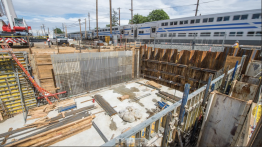Aviva Oppenheim ME’02

Aviva Oppenheim ME’02
According to Aviva Oppenheim, a Cooper engineering education is an ideal training for life as a Port Authority engineer. “It really prepared me for my work: at Cooper you’re in a community with really smart people, out-of-the-box thinkers,” she said in a recent interview, adding that class work problem-solving was often a group effort. The same can be said at her job where high stakes projects must be considered from every vantage point. “The best thing to do is to put us all into a room, have a discussion, and really learn from each other’s expertise. At Cooper I learned to appreciate that approach.”
Access to a Port Authority brain trust certainly behooved Oppenheim whose most recent project, upgrading a new cashless toll-collecting system, covered every crossing under the agency’s aegis, from the George Washington Bridge down to the Holland Tunnel, west to the Goethals, and all other toll points in between. This past December, the Lincoln Tunnel became the last to deactivate its toll booths and switch to the cashless system. Oppenheim and her team installed overhead gantries to capture tolling information, a system it took years to complete. Now drivers can continue driving without the need to decelerate, stop, and remerge with traffic each time a toll is collected. Last year, she was one of 13 agency employees who received the 2022 Pillars of the Port Authority Awards for her work on the project.
Of course, such a large-scale project required a great deal of discussion with a host of stakeholders. The Port Authority, says Oppenheim, takes its role as a good neighbor in the metropolitan area seriously. “We really have to know and understand the communities where we work.”
Oppenheim has brought her engineering expertise to her own community in Fair Lawn, New Jersey, when her synagogue needed a new mechitza, a partition separating men and women. It’s a project that provokes a lot of passion because there are numerous factors to consider, not least of which is how well it accommodates women’s access to religious services. According to a Port Authority story about Oppenheim, other synagogues looking to renovate their mechitza have reached out for her advice.
An added perk of the job? Her daughter and two sons’ reaction to driving under the hardware that records passing traffic on one of the many roads where the new cashless toll system has been installed: “We’re going under mom’s gantry!”




